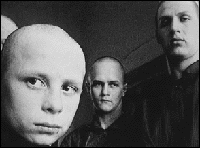|
|
|
監督・脚本:タラス・ポポフ、ウラジーミル・チュリキン
Director, Script : Taras Popov, Vladimir Tulkin |
1957年カザフスタンのカラガンダ生まれ。小児医学を学んだ後、内務省の医学心理学研究室で精神科医を務める。84年から95年にかけて少年院で精神科医として働く。93年から少年を隔離したときの心理状態の変化を調査するためにビデオカメラを使い始める。そのビデオ素材が『十字架を背負って』の土台となった。 Born in 1957 in Karaganda, Kazakhstan. After studies in pediatrical medicine, worked as a psychiatrist in medico-psychological laboratory of Ministry of Internal Affairs. In 1984-95, worked as psychiatrist for teenagers in young adults prison camp in Almaty. In 1993, started to use videocamera to investigate teenagers ' psychological processes while they are in isolation. This videomaterial became the foundation for Experimentum Crucis.
1955年カザフスタンのセミパラティンスク生まれ。1982年、カザフ国立大学物理数学科を卒業。87年レニングラード州立演劇音楽映画学校テレビ・プロデュ ーサー科を卒業。その後カザフフィルム・スタジオで働く。脚本家・舞台監督として国際的に評価の高い多くの作品をカザフスタンで手がける。 Born in 1955 in Semipalatinsk, Kazakhstan. In 1982, he graduated from the Kazakh State University, physico-mathematical faculty. In 1987, he graduated from the Leningrad State Institute of Theatre, Music and Cinema, TV Producers' department. Since then he worked at the Kazakhfilm Studio in various capacities, including screenwriter and stage manager for many internationally acclaimed works produced in Kazakhstan. |
 |
|
| 10年間少年院の精神科医を務めたタラス・ポポフが、初めてビデオカメラを手に、彼を友人と慕う子どもたちの語りを撮影した。少年院内での権力闘争や弱者の抑圧が外世界の縮図として暴かれ、カザフスタン社会の底辺に生きる者の厳しい現状を思わせる。 | Filmmaker Taras Popov worked as a psychiatrist at a prison for boys for over 10 years before taking a video camera in hand to shoot the stories of children who considered him a friend. This footage became the basis for this documentary. Revealing the harsh struggle for survival among the inmates in this miniature facsimile of outside society, the film portrays the grim reality of life on the bottom of society. |
|
|
|
|
監督のことば この映画の主題と、そこで描かれた普遍的かつ永久のジレンマは、映画人や映画批評家の間で論争を白熱させてきました。どの上映も観客の強烈な怒りをかき立てましたが、それはまるで映画のなかの怒りが観客側から跳ね返されてくるかのようでした。そうした感情はついにはカタルシスを迎え、浄化されるのかも知れません。映画の中の若い犯罪者たちが経験してきたこと、彼らの目や表情は、至聖の殉教者のそれに通ずるものがあります。宗教が伝えていることに思いをよせれば、この少年たちは、ある歴史的な変動期に足を掬われた者たちであり、つまり、社会が崩壊するとき最も苦しむ者は無垢な者や弱い者であるということにまさに当てはまっているのに気付くはずです。少年たちは社会の崩壊の犠牲者であり、それは聖書が伝えている、ローマ帝国の崩壊と共に押しつぶされた貧しい人や弱い者とまったく同じなのです。イエス・キリストの子ども時代にさえ、これらの子どもたちが受けたような苦痛や絶望がいくらかあったかもしれません。しかし彼らの場合、正義による正しい審判を聞く望みはこの映画を通してしかないのです。 |
Director's Statement The subject matter of the film and its portrayal of a universal and timeless dilemma, have led to heated debate among professionals and critics in the film world. Every showing inspires powerful feelings of anger -- reflecting some of the anger in the film; these feelings may result in catharsis. The experiences of these young offenders and their eyes and expressions correspond with those of the Holy Martyrs; the religious references serve to remind us that these boys are caught in a historical process; when societies disintegrate it is the innocent and the weak who suffer. These boys are victims of the break up of society in the same way as the Bible tells us, the poor and defenseless were crushed in the collapse of the Roman Empire. Even the childhood of Jesus Christ may have contained some of the pain and desperation of these children. But in their case, the only hope they have of a fair hearing of justice, is through this film. |

